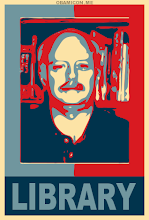1. There has been an increased focus on standardized testing. This focus has resulted in legislators and others defining achievement as solely high test scores.
2. Stripling and Hughes-Hassell assert that reaching high achievement is through developing independent learning skills.
2. Stripling and Hughes-Hassell assert that reaching high achievement is through developing independent learning skills.
- "Read and write with comprehension and expression."
- "Use mathematical and scientific principles to solve real-world problems."
- "Find, evaluate, and use information."
- "Seek and interpret multiple perspectives on historical/current issues."
- "Appreciate the arts and express themselves creatively."
- "Construct meaning for themselves."
3. Teachers and Teacher Librarians need to provide students with to develop and use those skills.
4. The one thing that the focus on achievement through standardized testing has brought is a focus on what should be included within curriculum.
5. The curriculum needs to spiral so that what is taught in earlier grades comes back in later grades.
5. The first step is to clarify curriculum expectations, but that is not the end of the work. You must also recognize and deal with competing expectations for assessment.
6. Key quote: Teachers who have embraced educational reform ideas are changing their instruction to focus on students' active learning and their ability to demonstrate and apply their learning.
Response
The introduction has three key components:
Second, in addressing the inequity in curriculum expectations we also address why schools that are "failing" in one state would be "passing" in another.
Third, active learning means that students will be apply to apply what they have learned to real-world problems and issues.
4. The one thing that the focus on achievement through standardized testing has brought is a focus on what should be included within curriculum.
5. The curriculum needs to spiral so that what is taught in earlier grades comes back in later grades.
5. The first step is to clarify curriculum expectations, but that is not the end of the work. You must also recognize and deal with competing expectations for assessment.
6. Key quote: Teachers who have embraced educational reform ideas are changing their instruction to focus on students' active learning and their ability to demonstrate and apply their learning.
Response
The introduction has three key components:
- Students should learn to be independent learners and the specific components necessary.
- There is an inequity in curriculum expectations across states and even across districts.
- Teachers need to change their instruction to focus on active learning.
Second, in addressing the inequity in curriculum expectations we also address why schools that are "failing" in one state would be "passing" in another.
Third, active learning means that students will be apply to apply what they have learned to real-world problems and issues.
Related Articles
Carmichael, P. (2008, June). An independent learning project that can change the culture of learning in your school. Access (10300155), 22(2), 27-33. Retrieved June 23, 2009, from Library, Information Science & Technology Abstracts with Full Text database.
Mokhtar, I., Majid, S., & Foo, S. (2008, September). Information literacy education: Applications of mediated learning and multiple intelligences. Library & Information Science Research (07408188), 30(3), 195-206. Retrieved June 23, 2009, doi:10.1016/j.lisr.2007.12.004

Great summary and response Tom. These are things that we already "know" but to read about it and think about it even more we can appreciate how much our students need this type of inquiry-based learning and skill building
ReplyDelete